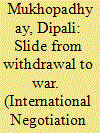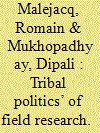| Srl | Item |
| 1 |
ID:
116428


|
|
|
|
|
| Publication |
2012.
|
| Summary/Abstract |
Abstract The United Nations represented an organization of severely limited means during the Cold War. The Secretary-General's office became one of the few instruments in the UN system with the power to influence international relations, albeit in limited ways. As Afghanistan emerged from one war in 1989, it risked falling into another involving the various Afghan stakeholders left to fight each other in the wake of their victory over the Soviets. The office of the Special Representative to the Secretary-General emerged as a key exponent of "quiet diplomacy," as various emissaries shuttled across the globe working to prevent this fragile post-conflict state's return to violent conflict. The operating environment was saturated with mistrust as a result of superpower tensions, regional agendas, ethno-religious differences, and a highly militarized landscape. This article considers the geopolitical, institutional, operational, and personal dimensions of this diplomatic campaign from the time of Soviet withdrawal until 1992. Ultimately, the campaign's limitations overwhelmed its advantages and the Afghan state dissolved into a dark period of warlordism and violence. This article explores the reasons for the eventual failure of diplomacy and its implications for quiet diplomatic efforts that have resurfaced in Afghanistan since 2001.
|
|
|
|
|
|
|
|
|
|
|
|
|
|
|
|
| 2 |
ID:
150505


|
|
|
|
|
| Summary/Abstract |
Can fieldwork still be done in today’s most violent warzones? We contend that long-held methodological principles about power and impartiality do not hold in today’s conflict-ridden environments. Research of this kind can still be pursued, but only if the scholar’s place is reconceived as one of limited power and unavoidable partiality. We argue that those still able to do fieldwork in sites of increasing danger do so by virtue of building their own ‘tribes,’ forming and joining different social micro-systems to collect data and, in some cases, survive. Field research must, therefore, be recognized as its own form of foreign intervention. In considering the future of political science research in the most challenging war-torn settings, we examine the risks and opportunities that accompany ‘tribal politics’ of this kind and underline the importance of reflecting on our own positionality in the process of knowledge production.
|
|
|
|
|
|
|
|
|
|
|
|
|
|
|
|